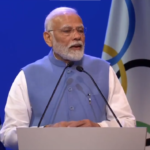Prime Minister Narendra Modi presided over high-level discussions on critical policing and security-related issues during the annual Director General (DG) and Inspector General (IG) Conference held in Bhubaneswar. The three-day event, which brought together India’s top police and security officials, focused on formulating strategies to address emerging security challenges and enhancing the efficiency of law enforcement agencies.
Focus Areas of the Conference
The conference, organized by the Intelligence Bureau, served as a platform to deliberate on a range of topics, including:
- Counter-Terrorism and Cybersecurity: Officials discussed evolving terror threats, cross-border infiltration, and the growing challenge of cybercrime. Special emphasis was placed on building robust cyber-defense mechanisms to counter increasing online threats.
- Modernization of Police Forces: Discussions highlighted the need to adopt cutting-edge technology, including artificial intelligence, data analytics, and drones, to modernize policing methods.
- Border Security and Coastal Surveillance: With India’s vast borders and coastline, the conference emphasized strengthening surveillance and intelligence-sharing mechanisms to safeguard national sovereignty.
- Internal Security: Special focus was given to tackling left-wing extremism, insurgencies in the Northeast, and other internal threats that pose risks to social harmony and development.
PM Modi’s Address
During the discussions, Prime Minister Modi stressed the importance of proactive and people-centric policing to enhance public trust. He called for greater coordination among state and central agencies, urging law enforcement to adopt a “whole-of-government” approach in tackling complex security challenges.
Modi also emphasized the integration of modern technology and data-driven approaches to ensure swift and effective responses to crimes. He advocated for increased investment in capacity-building programs and improving the working conditions of police personnel, including mental health support.
Key Outcomes and Initiatives Announced
The conference witnessed the announcement of several key initiatives, including:
- National Security Grid: A proposal to enhance real-time intelligence-sharing among states to tackle coordinated threats.
- Cybercrime Command Centers: Establishment of dedicated centers across India to combat cyber fraud and online extremism.
- AI-Driven Surveillance: Deployment of AI tools for predictive policing and identifying emerging threats.
Participation and Collaboration
The event saw participation from over 350 officials, including DGs, IGs, and representatives from paramilitary forces, intelligence agencies, and state police departments. The collaborative discussions underscored the importance of multi-agency coordination in addressing complex security dynamics.
Bhubaneswar: A Strategic Choice
Hosting the conference in Bhubaneswar, Odisha, highlighted the government’s focus on inclusive development and addressing region-specific security issues. Odisha, with its unique security challenges such as left-wing extremism, served as an ideal backdrop for discussions on grassroots-level policing.
Conclusion
The DG-IG Conference in Bhubaneswar reflected the government’s commitment to addressing contemporary security challenges and bolstering India’s law enforcement framework. Under PM Modi’s leadership, the conference underscored the importance of leveraging technology, fostering inter-agency cooperation, and prioritizing the welfare of police personnel.
As India navigates a rapidly changing security landscape, the outcomes of this conference are expected to strengthen the country’s preparedness and ensure the safety and well-being of its citizens.











